Head-To-Head: Samsung Galaxy S9 Vs. Apple iPhone X
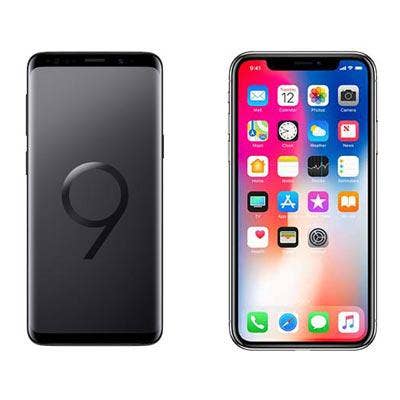
Face-Off
The 2018 smartphone battle is heating up. With Apple's iPhone X still fairly new to the market -- and seeing a slowdown in interest, according to some reports -- Samsung is entering the stage with the next generation of its popular Galaxy S Android phone line. The new Galaxy S9 builds on the trailblazing hardware design of the Galaxy S8 but adds improved specs and new capabilities around its camera, biometric authentication and speakers in a bid to outdo the iPhone X. Which of the smartphones is a better fit for you? In the following slides, we compare the Samsung Galaxy S9 with Apple's iPhone X on specs, features and price.
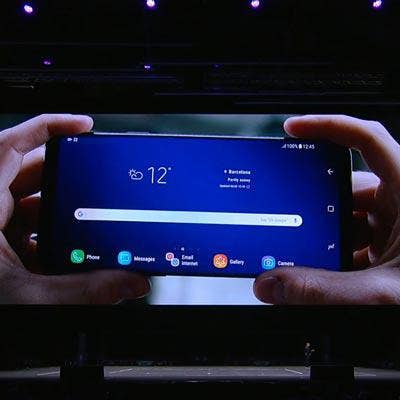
Display
Samsung is sticking to the Galaxy S8 formula with the Galaxy S9 display, keeping it at 5.8 inches in size. That matches the size of the iPhone X display. Both phones feature colorful and bright OLED displays, though the Galaxy S9 has the advantage in terms of resolution. The S9 includes 2,960 x 1,440 pixels, above the 2,436 x 1,125 resolution of the iPhone X.
Not surprisingly, Samsung also sticks with its nearly bezel-free, edge-to-edge design for the display on the Galaxy S9. While Apple has touted the iPhone X as its first edge-to-edge iPhone, there is of course actually a camera cutout at the top of the device's screen. While unveiling the Galaxy S9, Samsung executive Justin Denison took a jab at the iPhone X by saying that "as always, there's no notch" on the S9 display.
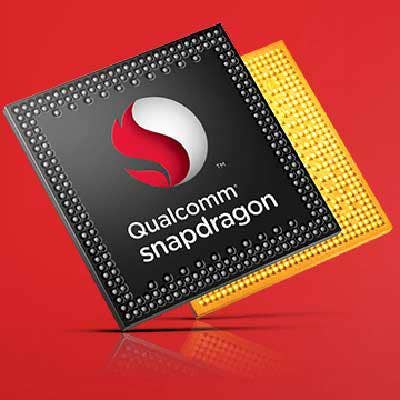
Processor, RAM And Storage
Samsung has built the Galaxy S9 around a faster new processor, the Qualcomm Snapdragon 845, which is an eight-core processor running at up to 2.8GHz. While we don't have benchmarks for the phone yet, that's above the iPhone X clock speed. The iPhone X is powered by the A11 Bionic processor, a six-core chip with two high-performance cores that reportedly clock at up to 2.39GHz. The other four cores offer enhanced battery efficiency on less-demanding tasks.
Samsung also includes more RAM in the Galaxy S9, at 4 GB, than Apple does with the iPhone X, which has 3 GB.
Both the Galaxy S9 and iPhone X feature 64 GB of internal storage at the base level. The iPhone X comes in a 256-GB model as well, while Samsung takes a different approach to offering additional storage with the S9 -- an optional microSD card that can add up to 400 GB of storage space.
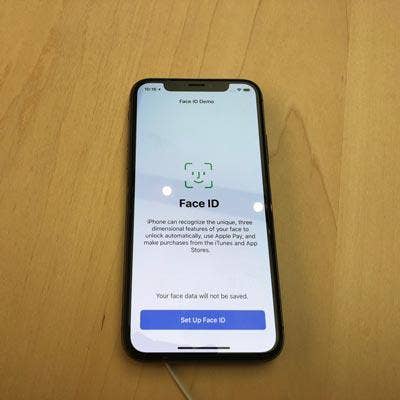
Biometrics
Apple drew a huge amount of attention for introducing Face ID facial recognition as the sole biometric authentication option for the iPhone X -- eliminating Touch ID fingerprint recognition. Samsung, which had already offered facial recognition in its phones prior to the iPhone X, is keeping that as one of three biometric options for unlocking the Galaxy S9 -- the others being fingerprint recognition and iris scanning.
There are two biometrics-related changes with the S9, however. The first is that a new authentication method, which is called Intelligent Scan, will be offered that combines iris scanning and facial recognition for purported faster unlocking. The second is that the Galaxy S9 fingerprint scanner has been moved to a position directly below the camera on the back of the phone, rather than its much-criticized placement next to the camera on the Galaxy S8.
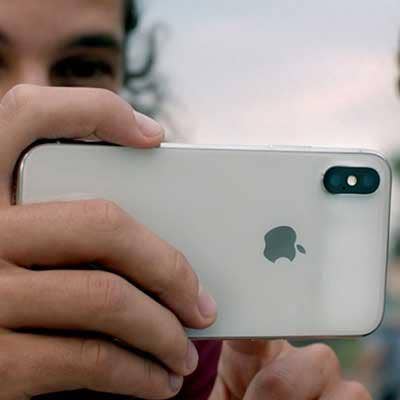
Camera
While Samsung has introduced a number of enhancements with the Galaxy S9 camera, it still remains a single-camera setup, in contrast to the dual camera of the iPhone X. The S9 includes a 12-megapixel rear camera with optical image stabilization, while the iPhone X includes 12-megapixel telephoto and wide-angle cameras with optical image stabilization.
The iPhone X includes camera features such as "portrait lighting," which improves the lighting of the contours over a subject's face, while the Galaxy S9 touts its low-light capabilities with an aperture that auto-adjusts to lighting conditions. The S9 camera also offers better slow-motion video and "live focus" for automatically blurring the background in a photo. We also can't forget to mention the Galaxy S9's AR Emoji feature, aimed at rivaling the iPhone X's Animoji in the realm of creating cartoon faces that replicate a user's facial movements (and facial features, in the case of AR Emoji).
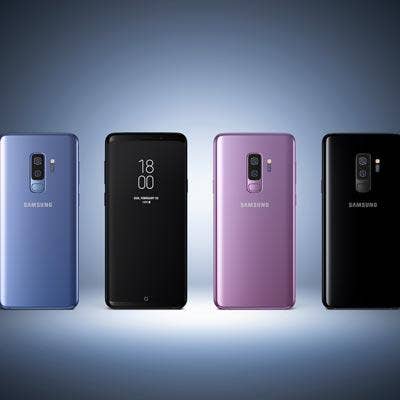
Battery Life And Water Resistance
Samsung isn't offering a battery life estimate for the Galaxy S9, but it's safe to assume the battery life will be in the ballpark of the 12 hours (over LTE) of the Galaxy S8. That's because the battery size of 3,000mAh on the S9 is identical to that of the S8. Twelve hours of battery life is also the same amount that Apple promises for internet use on the iPhone X, although the company doesn't specify whether that's for LTE or Wi-Fi.
The Galaxy S9 comes out ahead on water resistance with a rating of IP68, which suggests the device should withstand waters as deep as 5 feet for up to a half-hour. The iPhone X, which has a rating of IP67, also can last 30 minutes in the water but may run into problems if it goes deeper than 3.3 feet.
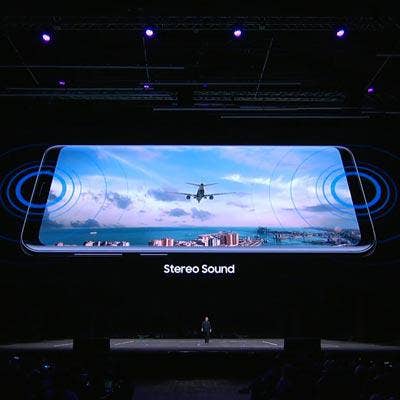
Audio
Unlike Apple, Samsung isn't giving up the headphone jack; the Galaxy S9 retains the standard 3.5mm jack. That's in contrast to the iPhone X, which can only connect to wired headphones using a Lightning adapter.
Both the Galaxy S9 and iPhone X feature stereo speakers, but Samsung is touting enhanced audio quality with the S9 thanks to tuning by acoustics specialist AKG and Dolby Atmos surround sound.
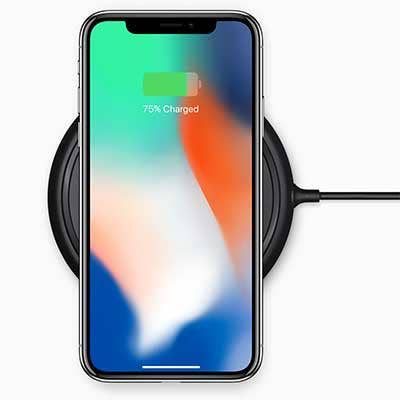
Special Features
One feature that the Galaxy S9 and iPhone X have in common is wireless charging, with capabilities for charging the devices (using Qi induction) by resting the device on a charging pad or mat.
Samsung has also unveiled a second-generation model of the DeX dock, which allows users to power an Android desktop experience using their Galaxy phone, for use with the Galaxy S9. The new DeX Pad lets you lay your phone flat on the dock rather than propping up the phone, and lets you use the phone itself as a trackpad for using the desktop.

Price And Availability
Rumors had initially suggested that Samsung might be raising its Galaxy S pricing to be more in line with the iPhone X, which famously has a starting price of $999. But that's not turned out to be the case. An unlocked Galaxy S9 is priced at $720, making it the more-affordable option by far compared with the iPhone X. Adding a 400-GB microSD card from SanDisk will add another $230, while getting the iPhone X with 256 GB of storage will cost you $1,149.
Pre-orders for the Galaxy S9 start on March 2, and the device begins shipping on March 16.